#she actually does lack agency is the thing
Explore tagged Tumblr posts
Note
As for your BDSM headcannon, I personally think otherwise and I would like to explain why: One common thing I noticed in Coffin is that sexual violence is typically shown to be a side effect from an unhealthy mental state:
Shots and Such explicitly mentions that Ashley claws at Andrew not out of a kink, but out of desire to give him back some of the pain he causes her and it's her way to vent at him.
Narration brings up how Andrew fantasized about kicking Julia's teeth in so she'd give a better head, and he grew to resent being with her more and more, treating her like an outlet rather than a person.
Renee and Douglas do have a loving relationship, but their life has always been falling apart around them, and Renee specifically feels a lot of anger, and guilt. She at several points has considered that they may have gone wrong somewhere, but Doug consistently coddled her and shut out any doubts, she considered reconciling with her mother, and Doug plugged the cord, she considered whether they should say anything about Nina, and Doug opted to turn a blind eye, she grappled with the idea of selling off their kids, but Doug ultimately decided to take the deal.
They may love each other, but Renee in particular has a lot of regrets and she's never shown to be in a good mental state or mood, which I think reflects upon her being rough with Doug.
In most routes, Ashley actually seems to still mourn her parents, and she seems to lament her lack of closure, she is upset over feeding Renee's soul to ???, she wanted to give them an eulogy in Sane Burial, and she keeps them around as playmates/prisoners in the vision of her having become a demon.
What I'm getting at, is that in Questionable Burial, her and Andrew effectively become their parents: Ashley/Renee have some lingering doubts/regrets, but Andrew/Doug coddle her and they keep distracting each other, living in a fantasy as their lives fall apart around them and they build up resentment.
We've been shown that Ashley has a really good sesne of intuition; for longest time I thought she's just paranoid over Andrew leaving her, but Decay makes it clear it's often on his mind, and the fact that throughout Burial, Ashley is very nervous and concerned should be an indicator to us that something has gone seriously wrong with them, but especially Andrew.
Questionable is the only ending in which Ashley does not mourn her parents, and I think it's an indicator that rather than face her own feelings, she's decided to instead fall back onto escapist delusions, supported by Andrew playing along, just like their parents.
Even at his worst, Andrew does not cover commiting any kind of sexual violence onto Ashley, and I don't think that in an ending where they actually get together and confront their personal demons, that would they be rough, as Coffin seems to generally indicate that rough intercourse is more of a side effect of various resentment that characters express of wish about.
You're right.
While I don't see them being gentle with each other even in a theoretically healthy relationship (as the playful prodding of each other is part of what they do to feel safe), that probably wouldn't extend to the bedroom. Ashley doesn't like, appreciate, or respect violence or aggression (further elaboration on this point pending because there's some deeper cut analysis there) and I sure as fuck know Andrew wouldn't be a bottom in any kind of relationship that'd be remotely healthy for him.
The ways in which they are intimate are a microcosm of their relationship as a whole and I don't see any way that anything healthy they could have would involve confining the other, even metaphorically. And if I were to get really, really, REALLY into the weeds of it I'd probably say that they'd have a "willing and open to it out of trust for each other but never actually do it" kind of thing.
Andrew appreciates Ashley's carefree nature too much to sexualize the opposite but also needs to assert his own agency and freedom etc etc
But that's also less funny than imagining these Looney Tunes-ass motherfuckers having Looney Tunes-ass sex.
41 notes
·
View notes
Text
When it comes to Farcille, most people talk about either the resurrection & subsequent bathhouse scene, or post-canon. But not many people talk about this moment from pre-canon which I think can be read with romantic connotations pretty easily
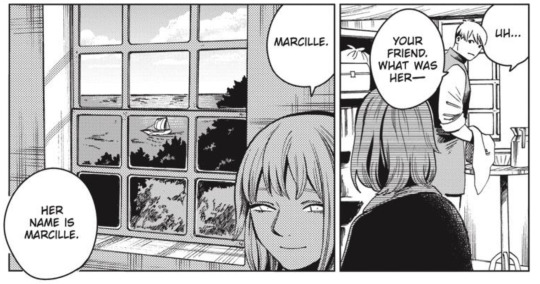
This isn’t much in the way of evidence per se, but Falin’s expression here is unusual compared to how she usually looks. Something about it feels…. gay to me lol
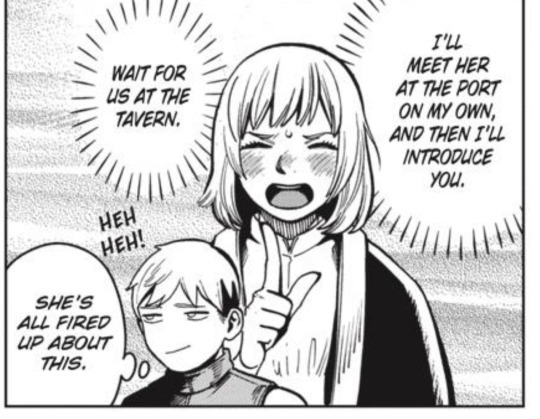
This 100% reads like someone introducing a partner to their family. Falin is normally pretty blushey as a default look to her face, but it’s obvious that she’s pretty excited about it, which Laios states himself
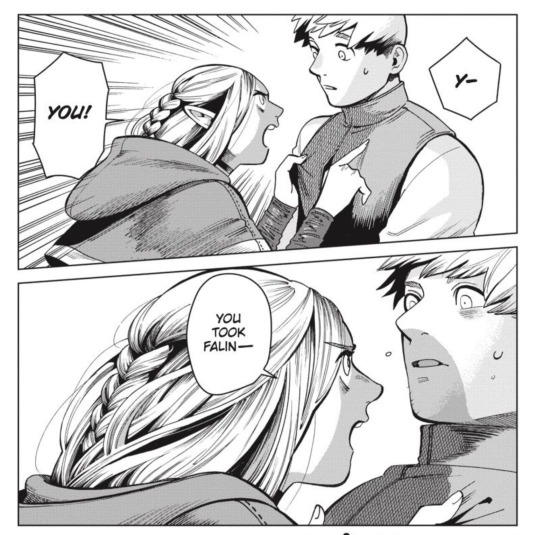
THIS MOMENT!! Possessive Marcille!! She’s never usually this forward but in this moment Marcille is pissed. Mainly because she likes to coddle Falin, and also probably wishful thinking that Falin was happier at magic school (and while meeting Marcille did make Falin slightly happier, she was pretty outcast & it doesn’t seem to be somewhere she enjoyed much. She ran away partly because she was worried about Laios, but also she never liked it much there in the first place), hence Marcille’s insistence to bring Falin back later on. That does actually happen I just didn’t add the panels
I’m sure there was genuine concern for Falin’s (presumed lack of) agency in running away, and actually considering the magic school to be better for Falin, but also Marcille is known for wanting control over certain things and probably just wanted Falin with her, from a selfish perspective & also to ‘protect’ her.
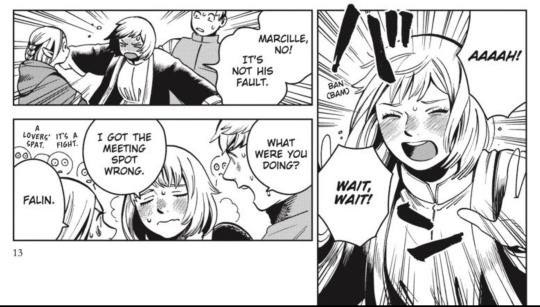
Anyway, then Falin bursts into the scene, and the whole ‘it’s not his fault’ looks so much like one of those ‘it’s not what it looks like!!’ romantic tropes, so much so that the crowd assume it to be a lovers spat lmao
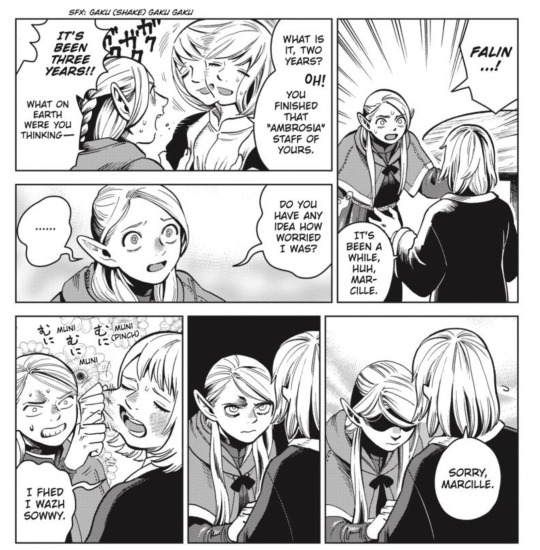
Falin downplays how excited she was to see Marcille (and also because the situation is pretty tense) by saying ‘It’s been a while huh?” pretty casually.
“What we’re you thinking?” “…. Do you have any idea how worried I was?” I love these lines, they’re so Marcille. The way she snaps from furious to soft to furious again shows just how much she cares about Falin.
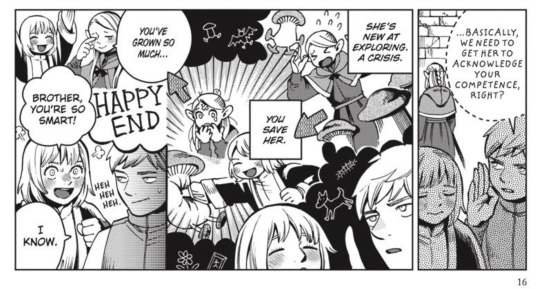
And then this final moment in the dungeon is so hilarious to me because it totally feels like the trope of ‘person trying to impress their love interest’ and goes just about as well as those sorts of schemes tend to work lol
#Farcille#Mossy rambles#Falin Touden#Falin#Farlyn Thorden#Marcille Donato#Marcille#Laios#Laios Touden#Sapphic stuff#hell yeah B)
3K notes
·
View notes
Text
a/n. pleasantly surprised at how quickly i wrote this bit, it practically wrote itself. glad the first part was interesting for a lot of you—i love writing about psych/therapy stuff (despite my complex relationship with 'em), and ofc bkg <3 i honestly don't know where i'm going with this, but it's been fun so far. (0.8k)
navigation. part 1, (you are here), part 3

thankfully—and to the relief of whatever dignity he had left—that interaction was short-lived.
well, it’s mostly because after you blinked at him for what felt like a torturous eternity and said a shaky hello back, he gave you a curt nod as if he wasn’t the one who just initiated the exchange and bolted it out of there without a single glance back.
that bit haunted him for the next few days, reappearing in his consciousness whenever the topic of therapy or anything remotely close to it was broached. he even snapped at kirishima when the redhead asked how his latest session went during one of their evening patrols together. it was a kneejerk reaction, an entirely out-of-proportion, aggressive response that shocked even him, which says a lot.
he should go ahead and text the guy an apology.
eventually, though, that unfortunate powwow slowly faded into the background of his exceptionally busy mind as the days went on. things got so hectic in the agency that he had to postpone his appointment for the week, which—quite frankly—is an upside to this chaos, because he sure wasn’t pumped about discussing his love life, or the lack thereof, with the jarringly knowing middle-aged lady. being able to definitively avoid you and buy you more time to forget about his stupid social blunder is merely the cherry on top.
okay, maybe the incident didn’t actually slip his mind after all.
“…bakugou-san? are you still with me?”
dazed, bakugou squeezes his eyes shut before fluttering them open, and what greets him is the very same lady against the backdrop of her increasingly familiar office, only this time she’s looking more concerned than perceptive.
right. he’s supposed to be in the middle of a session right now.
“yeah, sorry,” he mumbles, shaking his head in an attempt to rid himself of irrelevant thoughts and focus on the matters at hand. therapy is expensive, after all. “i’m here.”
that doesn’t seem to placate the woman who instead prods, much to his chagrin. “you seem out of it today. is there something in your mind that you want us to talk about?”
for a second, he debates caving and just telling her the dumb shit that happened two weeks ago, but then backtracks when it dawns on him how ridiculous everything is. what is he, a prepubescent boy? he died and survived a major war, for fuck’s sake. why is he so hung up on seeming awkward for once in his life?
even hearing it in his head is embarrassing enough.
that settles it, then. his lips are and will remain sealed.
but then his gaze refocuses on his therapist, and the sheer ‘unconditional positive regard’ or whatever the crap is called that she’s radiating becomes so palpable that it just spills out of him.
“i fucked up.”
that makes the lady frown—which, if he thinks about it, is understandable, because he rarely opens up about his failures, let alone this blatantly—although she manages to quickly school her expression into a more neutral one. “can i ask you to expound on it?”
at that, bakugou sighs, because it’s either he just tells the laughable truth or actually cite one of his actual mistakes—which he’s not feeling right now, by the way. or he can expertly maneuver the conversation to another topic, but something tells him there’s no getting out of the current subject. maybe today, there is, but it’ll surely loom over their next sessions indefinitely until either of them revisits it.
he should know. it’s happened to him too many times, he’s lost count.
with this realization, he can only sigh again.
“it’s stupid,” he preempts.
“i’d like to hear it regardless,” comes her classic, supportive response.
and so he does it. talk, that is. it starts off a bit rough—he didn’t know how to even begin without flushing like an idiot, but he managed to get the brief anecdote going. he still ended up blushing anyway—the warmth in his cheeks was undeniable—and if she noticed, she gratefully didn’t point it out. by the time he’s finished with the trivial tale, he’s mildly out of breath, having said everything in one continuous burst.
“i told you,” he spits when she doesn’t say anything for a beat. “it’s stupid.”
“i’d normally ask you to reconsider the adjectives you use for yourself and your experiences, but i think you’ve heard enough of that.”
he snorts. damn straight.
the woman then shoots him a smile, and he has to tamp down the reflex to bristle at an impending attempt to placate him. fortunately, it doesn’t come.
what does, instead, is a question.
one that catches him completely off guard.
“did you find her attractive?”
the fuck, is his first, immediate thought.
but then his normally trusty and acute brain seemingly comes to life and promptly supplies a second one that leaves him frozen and utterly dumbfounded.
yes.

˖⁺‧₊ as always, reblogs, replies, and tags are appreciated <3 feel free to drop an ask, too—i'd love to chat with you. have a nice day!
tagging. @bunnysaursushii @yawnzzzzzzzz @cholios @kashee-h @iluv-ace @lotuslovers @elarakive @sugurusmoon @napbatata @k0z3me @h0ngh0ngh0ng @honeyoru @yoongiwithglasses @hellokitty-doll @lilsebnem @tetsuukuroo @crangrapel0ver @syrhra | @kalulakunundrum @cheezemanz @gold24fish @lunaryasha
#writing bkg's internal monologue is too fun for me i should do it more#i'm always nervous about not doing him justice and making mistakes in characterizing him though#sighs#bakugou x reader#bakugou x y/n#bakugou katsuki x reader#bakugou imagines#bnha imagines#mha imagines#bnha scenarios#mha scenarios#bnha x reader#mha x reader#bakugou imagine#bakugou drabble#bakugou fluff#bakugo x reader#bakugo x y/n#bakugo x you#bakugo katsuki x reader#katsuki bakugo x reader
521 notes
·
View notes
Text
The thing about Solas in DAtV is that because they were fundamentally unwilling to engage with the question of whether or not the Veil should actually come down (which is a symptom of them refusing to engage with anything remotely 'problematic' in the franchise to date: slavery, elven oppression, treatment of both city elves and Dalish etc.) he goes from a character who is supposed to be the embodiment of wisdom to a character who is kinda stupid. And further, it affects our questions surrounding his motives and relationships, his actions in inquisition and how compelling he is.
Like, there's a lot of people arguing ATM about whether or not a romanced Lavellans relationship with Solas was meaningful/if she knew him compared to how Rook knows him/if he loved her more than Mythal. And I think the answer is very tied up in this particular issue with the writing.
Because if Solas is a revolutionary who believes that the veil must come down, not just to fix a perceived wrong he did, but for the good of elvenkind...if we take a Solas who says 'people are always dying, it's what they do' and realise that he's saying that because PEOPLE DIDNT USED TO DIE and the way their lives are now so short is terrifying to him, if we take a Solas who says that the world today is full of those who seem tranquil to him and take that SERIOUSLY, if we get a Solas who is sickened by the way spirits are yearning for the world the way it was but are stuck in the fade without any contact and that's twisting them into demons and those willing to possess others to taste a glimpse of what was denied to them by HIS actions...
Then we get a Solas whose actions don't just make sense but we can see WHY they make sense. We get a Solas who is, yes, committing an act of horrendous violence by tearing down the veil but is doing so to literally save the world rather than just fix a regret or because he's bound up in Mythal somehow and what she would have wanted for the world.
THAT Solas who leaves Lavellan because of his revolution he must lead, who leaves Lavellan after seeing what this world does to those who are left of the people, that Solas...I think that we could then argue more than the relationships he formed in inquisition were real and he was tragically forced away from them by his own goals. That in some way he is doing this FOR Lavellan.
There should be a sort of semi-horror tint to this world for us through Solas's eyes because we can see a world of tranquil walking around like he does, a world where life is too short, a world of injustice and pain and reasons to go ahead with his plan
But Solas....kinda lacks agency in DAtV. I don't hate the Solas Mythal plot stuff I think it's quite interesting, but mix it with us never considering the merits of what Solas wants to do, of EVERYONE unilaterally deciding it's evil with no real debate or queries, with ZERO elves in the narrative siding with Solas or taking what he has to say seriously...THATS where adding the Solas and Mythal plot rubs me the wrong way. I don't want Solas to need to be released by Mythal before he can let go of his evil plan...I want a Solas who doesn't have an evil plan but instead a complex one. I want the conviction of Anders in Solas; that what he's doing is RIGHT and the ONLY WAY to fix a great injustice. I don't want to redeem Solas or even understand him I want him to CONVINCE me and me BELIEVE him. Otherwise the Solas we see in inquisition is more shallow and the Solas we see in Veilguard through Rook...maybe Rook does know him better than the inquisition did.
#datv#solas#dai#bioware critical#i feel i am swinging at a hornets nest here i know people go to bat for solas#i was never one of them#but i wanted datv to make me be
607 notes
·
View notes
Note
thoughts on thasmin?
I find it (and a lot of the era) both pretty fascinating and kind of miserable and also not very good. I think enough has been said about how it goes basically unacknowledged until the last 3 episodes and how it feels queerbaity and how the main episode grappling with it is pretty bad, so let me throw something else into the ring: I think it thematically works, it's just that the themes are fucking nuts. In my opinion, the Chibnall era and especially its finale is, at the end of the day, trying to reconcile something it finds emotionally unsatisfying about the classic show - mainly that characters will leave the show suddenly and never really be mentioned again - by characterizing the Doctor as a person who habitually shuts people out before ultimately dropping contact with them and leaving them to emotionally deal with that. Dan, on day one of returning home, is immediately left with the impression that the Doctor is angry with him. After that, you see 80s characters Tegan and Ace on year 30, who have spent a sizeable amount of their lives under a similar impression. The Doctor, the show is saying, is someone who can never cease abandoning people and leaving them with this strife. Time will always run out, a production fact reimagined as a deepset anxiety for the characters. Everyone she knows will be doomed to the same fate of lost contact no matter what, and Yaz is next on the chopping block:

even though the doctor is the one rejecting her (and will ultimately leave her) by what's seemingly her own volition, she expresses that she doesn't actually want that at all. It's just, to her mind, unavoidable:


So you know theoretically I like this, there's something heady and despairing and metafictional about it. "I'm sorry Yaz, I'm fucked, I know for a fact that this season is gonna end and I'm gonna move on to the next person because that's how the casting works on this show so we might as well just cut it here." I feel like the obvious payoff to this would be the character going against this thought process in some way at the end, love is more important than inevitable loss, or whatever. But it actually comes to much weirder conclusion: It absolves the Doctor entirely. Her viewpoint is, in the end, truly objective and justified. She's positioned as someone who genuinely lacks agency, and the harm caused by these relationships suddenly ending and her never contacting again is simply an inevitable fact of the universe; even when she herself seems to be at fault, it's not a thing she herself actually does to people with any intent to harm. Most interestingly, I think, the emotional turmoil of the companions is characterized as basically being their own fault. Yaz tells Dan, for instance, that he's misinterpreting the Doctor being upset at him; she's acting that way because simply because she "doesn't like goodbyes" rather than out of anger:

Any assumption Tegan has made about why she never heard from him again is negated; he always cared, she just didn't get him:

Most pointedly, Ace's emotional resolution involves her acknowledging that she was entirely wrong in judging him for anything, as she was simply failing to grasp his personal burden:

TLDR; I think the thesis statement at the end of the chibnall era is basically "The Doctor leaves everyone, that's how the show works, and the only way the characters can find resolution is to move forward and just accept that it's not the Doctor's fault and no bad feelings were ever involved." (I think this is, again, the result of attempting to recontextualize the doctor losing contact with characters suddenly and with little or no resolution in the classic show as an entirely intentional character beat for her, without coming to any overly nasty conclusions about her being in the wrong)
So on that note, there's a lot of confusion over Yaz's ending; the doctor, dying, is like "well, that's it then, I'd rather be alone now" and Yaz accepts this without further pushback. It's not made especially clear why she has to leave or why she doesn't argue the point, and a lot of people have struggled to explain why she actually leaves (as they've never sent anyone away when they've died before)

I don't think this is quite as random as it's usually taken, though; Yaz here leaves the show when subject to the same inevitable abandonment the story has been exploring the entire time, but unlike the other characters, she actually gets the doctor. She's connected to them on a deep enough level to understand that they're not actually leaving on bad terms. She's accepted her role in this cycle and the doctor's lack of fault in it and will therefore never be tegan or ace or dan wondering what went wrong. She, unlike the doctor, holds all the agency here. It's her actions going forward that will determine if this is tragedy or merely bittersweet. And we know it's the latter, because she knows not to say goodbye. genuinely batshit and i kind of have to respect it. anyways I also just have to say it's wild that they have a set up where the doctor pressures yaz into taking a gun against her better judgement and then later gets shot and it's 1) not yaz who shoots her, 2) not the same gun and 3) not what kills her. my god they were so close to some insane tragically ironic gay drama there and they fucked it up. unforgivable. think of the fanart.
#basically i think the chibnall era makes sense i just uh. i disagree with what it's saying#delete later because this will get like 3 notes and i will feel insane#I'm offhandedly writing a comic about this whole thing but don't know if I'll ever publish that lol#doctor who#talking tag
360 notes
·
View notes
Text
Thinking about how one of Mel's flaws as a character, as I see it, is that she's fixated on being the power behind the throne, rather than the power itself, despite already having all the ability she needs to be an effective and incisive ruler.
We first see this characteristic of Mel's when she's a child, picturing the sort of hand-picked regent she would select to be her family's puppet.
But Ambessa points out even back then that there's no reason Mel couldn't rule directly. This I imagine is part of the whole fox vs. wolf theme that is a source of tension between them.
In Mel's defense, there's plenty of good reasons to be the power behind the throne. It gives you a lot more deniability and an easy escape-hatch if something goes wrong. You can always throw the puppet to the wolves and start fresh. But it demonstrates a lack of commitment to always be hedging like that and it also lose you a certain amount of direct control. After all, the puppet can always grow teeth.
I think about this in relation to Jayce's Man of Progress image and how he needed to be the face of Hextech (and eventually a Councilor). Because why did he need to be the face of Hextech? Why couldn't Mel do it?
Mel was one of their first believers. She enabled their creation on the night of its inception. Why couldn't she be a partner in Hextech from the beginning, handling the public-facing side from the start? Or taken over from Jayce once it went from prototype to proven quantity?
I'd argue that if she had, a lot of the tragedies that befall Mel later would have been averted.
First of all, it's not as if there's an air-gap between the State and Hextech. There'd be no appearance of impropriety if Mel championed Hextech from the point where the Hexgates open. The Hexgates and Piltover had become synonymous by that point, there's no reason she couldn't continue to advocate and get funding for Hextech even as a Councilor. She had a skill for it, and the knowledge, and connections.
She could have allowed Jayce to remain in the lab, working on new innovations, occasionally coming out to offer the more scientific explanations as needed. But she didn't, why? (Doylist, obviously because we wouldn't have a story, etc. etc.)
I would argue it's part of the flaw or challenge she's facing in the story: she always wants to be the power behind the throne. So she helps elevate Jayce and supports his public persona. This persists until she sees an opportunity for an even bigger play by making Jayce a Councilor. Again, she sees a bright, charismatic, well-intentioned and easily-moldable person that she can work through to enact her own goals in Piltover and, because she is actually a good person, theirs too. She's not entirely self-serving and that's where she's different from Ambessa.
But this is where the problem of setting up a puppet sets in. Because Jayce has agency and he grows teeth and he pushes back on things Mel wouldn't want and does things she wouldn't advise with her superior political experience. Had she been the one in power instead of the power behind the throne, she could have avoided this, she could have molded the situation more specifically to her preferences, based on her superior knowledge. Jayce didn't want to be out in front of the crowd. He wanted to stay in the lab. Mel being the public face would have worked just fine for about 90% of the public appearances a representative of Hextech would need to make to the world. (I say this as someone who works as a public face in tech and has been a startup founder myself, such a role for Mel totally exists and often goes to someone who is a bigger name when the founders themselves are not charismatic or would simply prefer not to do all the wheeling and dealing.)
And this flaw loses her the relationship she could have had with Jayce, I'd argue. If she'd more directly worked alongside Jayce and Viktor, and taken over being the public face, she wouldn't have needed to manipulate Jayce or raise him to the Council, which were the dealbreakers that made him break up with her later.
Of course, they may not have had any reason to date in such a world but then, maybe they would have anyway as partners, now with a stronger foundation beneath them of working together, with both Jayce and Viktor relieved that the public, political side is being handled by a pro with a ton of resources (not that there wouldn't have been tension at all but certainly, this is a world in which I could see some flavor of MelJayVik happening harmoniously).
There's a Silicon Valley AU buried in all of this, free to a good home, but a world where Mel came on as a full partner early on would certainly be fascinating.
286 notes
·
View notes
Text
As much as I appreciate the people defending Ford in the wake of TBOB's release, and discussing the importance of avoiding victim-blaming and being aware of a person's environment, there's something specific that rubs me the wrong way about some of the things I've read.
The thing about abuse is that takes agency away from its victims. This is actually something that broadly applies to different forms of trauma, as I've just been going over in one of my classes on Adolescent Development. My professor for that class specializes in trauma-informing and training, so she has an entire unit on trauma as part of the syllabus, and one of the things she emphasized was that giving people agency and control over their own choices is critical to helping them recover from a traumatic event.
When it comes to Bill's possession of Ford, the lack of control is even more literal. Ford literally has his body puppeted by a demon, and his mind altered as well. Others have taken agency from him to a lesser extent—Stan limiting his choices in education, Fiddleford potentially using the memory gun on him, as another analysis post I can't find did a really good job of breaking down—but it's not as all-encompassing as Bill's abuse, and Stan and Fidds both make better choices later in the series. Bill refuses to.
But I'm getting off topic. My point is, Ford's loss of agency is one of the most crucial pieces of his character arc. It's why he lashes out so strongly when he returns home, against his will, to find that his identity has been stolen. It probably factors into his need to be the "hero", to be the one to defeat Bill. And even though he ultimately isn't that "hero", and he does let the Mystery Shack continue to operate, he does ultimately get more of a choice in the matter. He chooses to go along with the plan. He chooses to go with Stan on their long-overdue adventure.
But there's something else he does too. He apologizes.
Why is that so important? Because in regaining his sense of agency, he also undertakes the accountability that goes with it. He isn't solely to blame for everything that happened to him, or even necessarily every choice he made, but he did make bad choices.
And that's the thing that bothers me about some Ford analyses and defenses. Some people go too far and say that Ford isn't to blame for anything that he's done. Not only is that untrue, but it is once again stripping him of his agency. He is an adult capable of making his own decisions, and ergo capable of making bad decisions. And we need to accept that, without infantilizing him or blaming everyone else around him.
One of the things that compels me so much about Gravity Falls is that is generally does strike this balance pretty well, of personal agency vs. external circumstances. (There's also an excellent analysis post out there somewhere about Dipper and Mabel's agency, how the show doesn't force them to fix the problems of their predecessors or burden them exclusively with saving the world, but does still let them have agency and power in the fight and in Stan's recovery.) There are so, so many things that happen to the main cast that are mostly outside of their control, and also bad decisions that a lot of them have made that cannot be excused, at least not fully, by their circumstances.
And the beautiful thing about that agency is that these characters are also able to use it to become better people, to regain control over their lives, to take back power after it was taken from them. But you have to let them, and that includes letting them be people who messed up, owned up, and worked to make it better.
In fact, I think the reason that Ford is so quick to own up to his mistakes when it comes to Bill is because that's one of the ways he's taking back his power. He's incredibly stubborn when it comes to holding other grudges, but with Bill, he readily admits to Stan and Dipper separately that he's made some "terrible mistakes", to use his words. And he isn't to blame for falling for Bill's manipulation—Bill was the one actively manipulating—but no, he should not have summoned him to begin with. That doesn't make him deserving of anything Bill did to him, but by admitting to the mistakes he did make and working on a way to defeat Bill, it's letting him take back some amount of control in the whole situation. He can't make Bill change his ways, but he can own up to and correct the things he did wrong.
He does overcorrect a bit; I do think he blames himself too much for "falling for Bill's flattery." But generally, I like how he also doesn't try to blame Bill for every single thing that went wrong with the whole portal deal, like he (initially) did with some other situations, especially everything with Stan.
Anway. Let Ford make mistakes. Let him be wrong sometimes. Let him have his agency.
#gravity falls#ford pines#stanford pines#bill cipher#gravity falls analysis#does a children's cartoon really need to be taken this seriously? probably not.#but I do think the mentality behind some of these posts does need to be looked at#there's probably more I could add but I think this is long enough as is#gonna be real I don't love the third and second to last paragraphs.#I don't love how I worded it but I can't think of a better way to explain it
210 notes
·
View notes
Text
Ena saying, after being asked "you have a job??": "it's more of a lifestyle. That's my destiny, what more could i do?............god knows the rest"
And after being called "boss lady", saying "oh I'm no longer the boss of myself"
....
Bbg did you get forced into this job??? Did you not have a choice?????
And with the fact that she doesn't allow herself to have any fun or feel any real joy as long as she's working
and the flashback(?) scene of her in a war(?) with bullets raining on her from her hat?
Girl, what happened to you, I'm getting seriously worried
+ the weird ENA racism going on in that whole universe apparently
And the whole thing of her constantly saying "god bless you" and "you are still a child of god" to everyone who does business with her, yet when the genie start absolving her of her sins and saying she's forgiven, and starting to turn her into an angel. Only to realise she's an Ena, and immediately going "nevermind, you're unforgiven", and saying that nobody would ever be punished for the sin of being born, "except you"
There's a serious theme of not having a choice. or rather, never being given one
No choice in what you can do, how you're perceived. Pushed around and almost never respected, and all of this just because of her "species", something she had (probably ?) no control over
Some people are polite, and some even like her, but i don't think she has a single friend
Something series!Ena also kinda has.
Jugement just because of what she is, and a lack of fun, though hers seems a lot more like depression, with how she's genuinely trying to feel joy and keeps seeking it out.
She also has a friend, but only one, and Moony's kind of a jerk to her sometimes, but it feels more like her ego rather than genuine distaste towards Ena.
She also responds differently to the people talking to her
Where bbq!Ena's foreign speaking characters will have subtitles/what Ena is choosing(?) to hear be slightly toned down, it still gets the idea across of how they're insulting her, and she responds accordingly. Meanwhile, series!Ena will have foreign characters insult her just the same, but the subtitles/what she's choosing to hear are completely different sometimes (Merci(?)), sounding friendly and supportive, and she responds kindly and like they were a friend
And also the fact that when bbq!Ena deviates from what she was supposed to do (go to the bathroom to stop the smoke), and goes to the purge event. A choice. She immediately regrets it, hates it, looses an arm, wants to leave, and ends up getting eaten and dying in a bad ending
The second she made an actual choice herself, she fucking died
No choices allowed. No agency
I'm so curious about what the deal is with the ENA hate in that world
Edit: ALSO the shaman is the only one who's exactly on the same wavelength as her, they even finish each other's sentences
The shaman is also really disliked and an outcast, just like her
And he tells her "YOU are here because *you want* to be. I can see it in your eyes"
More mention of choice and freedom
Edit 2: start of the purge event when meanie Ena says "I crave freedom, and the genie is my only escape !"
Edit 3: the half hand guy with the red threads say "Glory it is to see your actions while YOU are trapped here, in captivity"
Edit 4: the guy stuck in the building who's struggling to get out, and stops to stare at you if you get close
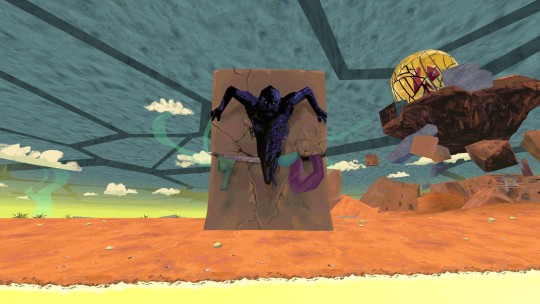
Once the door closes and everything gets half destroyed half auctioned off, and it's pretty much a wasteland, you find him on the ground, looking off into the abyss, saying "i was born with a purpose from the bells of creation. My soul was poured into the river of time, and my flesh under the pressure of life. A disturbing relief is what is in front of me"
He was trapped, just like her, but now he's free
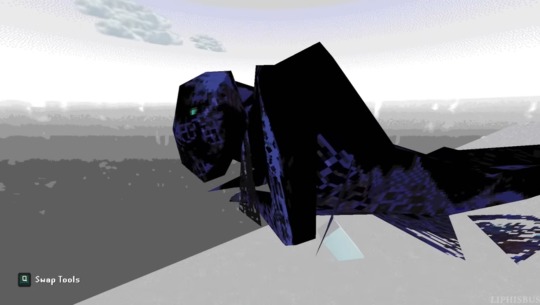
And the bells of creation...the guy in the cave said "the key to enter the bathroom, two isn't enough. They say if you hear three, you can see it. Ask not for whom the bell tolls, ENA. Bells."
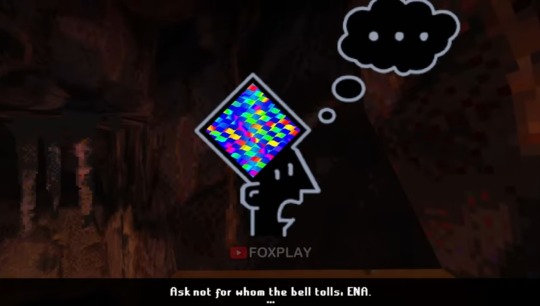
175 notes
·
View notes
Text
Something I think about a lot and wonder if maybe gets overlooked in Twilight’s story and as vitally indicative of his character is actually in the very first chapter:
Anya isn’t needed for Strix. Twilight decides to adopt her anyway.


[Spoiler warning: Mostly this post deals with early chapters already in the anime but there is reference to chapter 62, which has not yet been animated and will be in season 3]
Twilight decides it — “I’m going to rework the mission so it doesn’t involve a child because that’s too dangerous” and he’s 100% right! Donovan Desmond is canonically a far right warmonger with fascistic authoritarian aims. His government made liberal use of the SSS — a group to mirror the Stasi — who continue to operate in morally dubious ways (much more likely they’re actively morally reprehensible, though we’ve mostly only had rumours of that so far). From what we can tell, Desmond is at best an absent father and likely actually worse than that: if that's how he treats his own children, imagine how he might treat others. And the timeline seems to indicate that the experimentation performed on Anya was done under Desmond's government — even if Twilight isn't aware of experimentation on children, he is aware of both human and animal experimentation under Desmond's government. Taking all that and also the complexity of Strix's aims, undoubtedly there were other things that could be done, more straightforward if not necessarily easier.
So. Why? Why entertain the change at all? And then, having entertained it, why go back when the reasoning is indisputable?
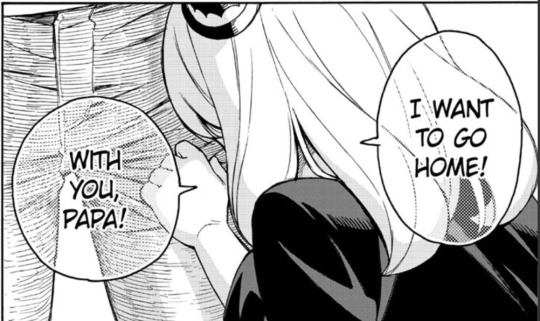
On the Doylist level, I think Endo wanted to ensure that Anya had some agency within the set up — Endo also does this with Yor. It would be much harder to be on Twilight’s side fully, or to trust him on an ethical level/take him as any sort of moral authority, if he were just straightforwardly using these two people. To have them be active and consenting participants (arguably to actually be affirming the arrangement: Twilight sets it up, but Anya and Yor actually make it happen) even if the audience only knows the depth of their knowledge/motivations/etc currently, shifts the power dynamic in important ways.
But it also the set up tells us important things about Twilight. He is largely impatient, cold, detached in chapter one. His overarching feelings towards Anya are, I think, real annoyance, real confusion, and real impatience. He just doesn’t understand this damn kid and it turns out she’s a person which is frankly unacceptable — he’d needed and anticipated an automaton, ideally of himself in miniature form. (Though I think one could ponder whether Twilight was, in many ways, an automaton himself at this point, but that's maybe for another meta 🙃)
He’s not entirely unmoved of course — we're given to understand he’s affected when Franky tells him how many times Anya’s been adopted and returned, and isn't amused by Franky's joke about names. Franky's comment — "Just don't get attached" — reinforces this. The prospect of “the future” perturbs Twilight when he’s reading the parenting books. His initial reaction to Anya’s kidnap is horror. All these are true too.
Then there’s also this, from earlier in the chapter:

It’s exposition, yeah, and it’s also exposing. "Hopes" and "joys" are very specific words to describe those events. It could simply have been "A marriage? An ordinary life?" but describing them as such — hope for marriage; joy in ordinary life — expose something of what Twilight feels about those two experiences and, on the flipside, they expose what he deems he's lacking. No hopes of intimacy; no joy in (an ordinary) life. There's an argument as well, of course, that he's being ironic but I don't think that actually invalidates the above analysis. Drawing attention to 'hope' and 'joy' at all are revealing, regardless of Twilight's tone in thinking of them. I think it's also interesting this panel, taken in conjunction with a pair of panels in chapter 62, Twilight's backstory. The above is almost a pulled out version of this below panel of Twilight's recollection of his childhood, and of course the returning image of not just a rubbish bin but a rubbish bin on fire when it comes to disposing of his identity:


Back to Strix. Both his final interaction with Karen and the whole everything of the framing of Strix is making Twilight think (and feel, ahem) things that he hasn't for some time. Twilight decides, I’m reworking this. It can’t proceed this way. Not because Anya is a pain in his ass, not because she’s not as (apparently) intellectually advanced as he’d originally thought, not even because he thinks he can find another child who would better be exactly what mission parameters called for. No:

And what changes his mind is Anya asking to come home.

One of the important parts of this to me is this:

He seeks consent.
This moment is a keystone, I think, to understanding Twilight. It’s also more telling than he maybe realises. Twilight is decisive — we all laugh because he spirals at the drop of a hat when his daughter or wife look even mildly upset but outside those (also very telling) scenarios, he makes decisions and he pursues them. Often he makes decisions quickly. He’s a dab hand at it; it’s a large part of why he’s as good a spy as he is.
He’d decided to change Strix.
Anya asks him, in essence, not to.
So, he doesn't.
But it's wild that he entertains keeping her request at all — why? Why even entertain it? It’s dangerous; it’s impractical; there are too many moving parts outside his direct control; Anya isn’t the sort of child he’d wanted for the mission if he’d spent any time thinking about what a child might actually be like; Strix is in many ways an extremely long shot anyway, Desmond could just stop attending for reasons unknown and unrelated; etc.
So, yeah, why? Maybe because of this —

In conjunction, I often think of this moment in the cruise arc:


Twilight first naming the feeling as lonesome, and secondly tacitly conceding that he perceives Yor as a companion and that that relationship is important to him, something to be missed. What makes this for me though is that Anya calls this out "Papa's you're so sappy" and Twilight's reaction is that of someone caught-out. He doesn’t say “nuh-uh!” but he may as well have. Essentially, something landed a bit close to home, hm? Maybe some of that hope for marriage? A soupçon of joy of an ordinary life?
Twilight’s loneliness underpins many of his decisions with his family — probably without him being fully conscious of it. I think he is at least somewhat conscious of it, but also if he looks too closely... Well, best not to. I could fill this post, I think, with images that demonstrate his loneliness throughout the series; that sorrowful/pensive close-up of his eye(s) is one of the abiding motifs for Twilight throughout. I'd probably start with this one from Twilight's backstory arc:

Anya's request plays directly off his loneliness. Still though, he doesn’t immediately capitulate — he emphasises Anya’s choice. Is she sure? The last day has been scary for a child (and for him, but he's ignoring that part) and Twilight, in his increasing recognition that Anya is a person, is probably aware in the back of his mind that he hasn’t exactly been warm or welcoming or at all patient with her. Things that people respond to — he's otherwise excellent at manipulating people, so of course he understands this. So. Given she'd just had this scary experience, given he hasn't exactly been great with her: Is she sure? She wants to come home — with him?
I think the moment may get a little lost because Anya says something riffing off his own earlier thoughts and self-revelation (featuring that shadowed, lonely eye motif again!)

Were this a post about Anya, I’d talk about how it’s an important character moment for her as well by way both of demonstrating her agency/choice and also that she isn’t nearly as dumb as Twilight thinks (and the audience, maybe, also thinks).
But in my view, she didn’t actually need to say anything about it making her cry. I think she could simply have said yes in that moment and Twilight would have agreed.
Twilight’s an unreliable narrator; he’s disconnected from his heart and that shrouds his own motivations from himself — something he actually also concedes in this chapter!


And it shrouds from us just how much he actually understands himself. He’s also a master of deflection. Easy to assume or say that bringing Anya home is just to align with Strix. Nothing more to see here; nothing else going on. But also that ripping off of the mask in the panel above — and the literal 'riiip' sound effects — also indicate to us that this is an unveiling to himself.
In my view, Twilight agreeing to Anya's request, deciding to go back to original mission parameters, actually shifts his motivations, subtly. Now he’s committed not only to the original mission goals, but also to Anya. He needs Anya to succeed at Strix, not only for Strix's sake, but also because otherwise the mission will end and she’ll have to go back to the orphanage, and he’s just agreed with her not to do that (not right away, in any case). I don’t think at this point he’s thinking it’s forever — his thoughts throughout the manga indicate he still expects the Forgers to be temporary. I don't think the shift in motivation is necessarily even conscious, but given the set up, I think something inside Twilight recognises that agreeing to bring Anya home is a compact, jointly engaged. Mostly all this has become subsumed into Strix: he makes decisions. He pursues them. He deflects, even from himself. Of course it's just for the mission; this saved him the trouble of reworking it, of figuring out something else. Nothing more to see; no need to think any more on it. And to be fair to him, Strix is very high stakes, resting pretty solely on his shoulders, so of course that is, objectively, motivation enough. Why even consider beyond that?
But I personally think that to the extent he's aware of it at all, there is something else going on, that he wants to have Anya for as long as it takes him to work something else out for her. If that's the case, then of course, we have Occam’s razor: the simplest solution may be the best one.
Maybe Twilight should just keep Anya himself, eh?

[Image description: gif from Spy x Family season 1, episode 1. Twilight and Anya have just found out Anya passed her entrance exam and are overjoyed. Celebratory, Twilight picks Anya up and swoops her into the air as they smile at one another. End image description]
#spy x family#spy x family meta#agent twilight#loid forger#sxf manga#sxf manga spoilers#i haven't talked too much about yor in this but ofc she is also an important part of this dynamic#i’ve been in my thoughts for weeks about twilight and they’re all pouring out 🥲#i tried to work them out in fic first but it was not enough 😤#should I put some of this post behind a cut? pls lmk if yes#also caveat that ofc i'm working from translations which may sometimes miss nuance/be somewhat off from endo's originals#here fandom take this!#gif#and i had a whole section about the complexity of consent in children and particularly a child with anya's background#ultimately tho this is fiction we're discussing and i'm sticking within those parametres pls and thx
423 notes
·
View notes
Note
yippee! apologies if my takes are horrendously bad
my personal take on the matter is that i definitely think the dark worlds can work as a metaphor for escapism without undermining the darkners' personhood. it can be more than one thing, yknow? the darkners are important, their lives matter. and the lightners do go to the dark world as an escape from the problems they face in their own life. but that's not the darkners' whole PURPOSE, yknow? i mean. according to the laws of the universe of deltarune yes darkners' "purpose" is to serve the lightners but like it's not their whole purpose in the STORY.
it's sort of like how, in UNDERTALE, LOVE represents how distant you've become, how easy it is for you to hurt people. but it also literally gives you the power to destroy the world.
i think the biggest reason i believe escapism is at least a part of deltarune's narrative is queen.
queen's whole speech in both of her fights is about how she intends to provide escapism for the lightners (so that they will worship her but also so that they will he happy). she wants to turn the whole world into a dark world, so that everyone can live in bliss and not have to worry about the woes of the light world. she mentions "Staring, Tapping, To Receive Joy. Staring, Tapping, To Avoid Pain." which is like pretty much the definition of escapism
she wants to help Noelle with the problems she faces in the light world ("Noelle. Who Will Be There To Help Her? Her Strange And Sad Searches" and "My One Idea To Help Noelle, Failed") by just... shoving it away for a blissful fantasy world ("Wake? No, She Has Already Awakened Too Much. Let Her Close Her Eyes And Sleep Away, Into A Darker, Darker Dream.")
...i forgot the rest of what i wanted to say!
well first off, thank you for your ask! I'm going to get extremely in depth in my answer, so bear with me here. sorry it took several weeks to write this. the escapism reading of deltarune is pretty deeply entrenched in fandom, and to refute it, I felt it required a full-length essay to completely explain my viewpoint.
yes, "the lightners desire escapism" does not automatically translate to that being the darkners' actual narrative purpose. escapism can be a theme without dehumanizing those who are used in order to escape - in fact, I've read a number of stories that use someone's desire to escape to HIGHLIGHT how they're hurting others in pursuit of that. I believe that toby fox is definitely capable of telling a story about kids having a valid desire to escape, and about them grappling with having inadvertently created a world of real, living people as a result.
(I'll reiterate again that this is not the story arc that generally shows up in fanon. the common consensus is that the game will end in an omori-esque "growing out of" the dark worlds. it's why I have a huge dislike of the fanon escapism reading, given that the darkners are shown as people whose lack of agency parallels kris' own. it would feel cheap if the resolution to that plot was that the darkners were actually never meant to be agents in their own fates. but this is a digression.)
the reason why i DON'T believe that this is a story that toby fox is telling is because of the way the world, themes, and characters are written. put simply, it just doesn't come across as congruent with the story being told.
deltarune's main themes are agency, fate, identity, and control. this is a conflict that shows up in nearly every major character, is baked into the worldbuilding, and is the central struggle involving us, the player. the protagonist of deltarune is literally possessed by us against their will. the darkners are objects that have no choice but to serve and be discarded. over and over again, there is emphasis on roles that characters play - and crucially, roles that are imposed on them.
what would escapism mean, in this thematic context? in real life, escapism can represent any number of things, but in a story, a major narrative theme generally has to dovetail with other major narrative themes in the work. I would argue that escapism in deltarune would likely mean going to a place where characters are able to choose for themselves what roles they embody, or even to discard the notion of roles altogether. a fantasy of control is the only way to escape a reality where you have no agency. and honestly, it's hard to imagine that something could count as an escapist fantasy if you don't even get to choose whether or not you participate in it.
let's talk about kris.
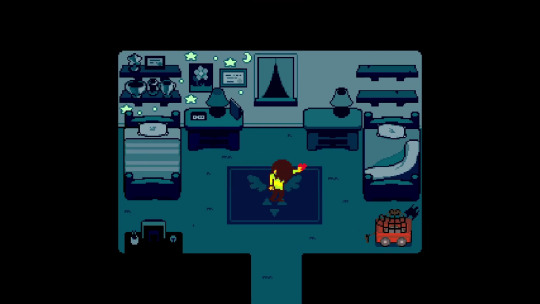
I see a lot of discussions around kris that say that kris goes into the dark worlds to escape. the dark worlds are posited as kris' fantasy of heroism. it's a world where they can seem heroic and cool, a world where they can have friends. this theory makes a decent amount of sense on the surface level, but only until you consider that kris is being controlled in order to go into the dark worlds. and it is not a control that they appear to welcome.
if those worlds represent kris' fantasy, then why don't they get to choose what happens in those fantasies? why are they being controlled by an external force, one that they actively push back against? if it's really an escape, then why does everything about this world reflect their lack of agency? if they really think this world is just a pure fantasy, then why do they care if spamton falls when his strings are cut?
because they're being deliberately obscured to the player, it is hard to say how kris actually feels about many subjects... but I do seriously doubt that they view the dark worlds as an escape. they don't act in a way that is consistent with that. they resist their lack of agency, and what little we do see of their reactions to darkner characters doesn't suggest that they view those characters as part of a disposable fantasy, either. they seem to have complicated feelings on ralsei. and of course, one of their biggest emotional reactions in the game is to the spamton fight. I would argue that that suggests they have empathy for spamton, which is a hard emotional reaction to have if you believe he's just part of a fantasy. not impossible, mind you, but it seems unlikely that kris believes that all this is simply fantasy.
also, considering that snowgrave both actively discredits the idea that the dark worlds are mere fantasy and is actively traumatic for kris... I seriously doubt they'd open another dark world in chapter 3 on a snowgrave run if their motive was purely to escape. on that route, they've seen the damage we can cause in a dark world. they know that berdly has sustained lasting damage due to our actions, assuming he's not outright dead. why would they want to try and "escape" to a place like that again now that they know what can happen?
the only answer is that they have a motive that isn't escapist.
now, as for ralsei... what part does he have to play in all this?

ralsei does play a lot to the fun, fantastical elements of the dark worlds. he delivers the prophecy that kickstarts the adventure. he flatters both kris and susie endlessly when they act appropriately heroic. he welcomes them into the castle and even makes nice rooms for them. he initially seems tailor-made to enable a fantastical experience where no real issues can ever complicate anything, and where the pain of reality can successfully be hidden from. but there's a lot of complications to the idea that he might represent an escapist fantasy.
the first, and what honestly seems the most important to me, is that he doesn't encourage kris and susie to remain in the dark worlds. he is welcoming and kind, but once the adventure is over, he prompts them to return to the light world. he wants them to deal with their more "real" problems like homework. that doesn't feel like he is trying to facilitate escapism in them. a real fantasy would encourage you to stay in it, wouldn't it?
and while ralsei is definitely invested in making sure the lightners are happy, there are always cracks that show. he isn't able to make kris ignore what happened in the spamton fight. he isn't able to convince susie to be peaceful and kind. and in his very essence, he represents a number of uncomfortable ideas. very importantly, he represents a number of uncomfortable ideas to kris.
this probably ain't your first fandom rodeo, so I'm not going to explain all the different ways that ralsei interacts with kris' personal issues. there's plenty of posts on it out there. what i will point out is, once again, it feels odd that a character who seems tailor made to bring up kris' most uncomfortable associations with their lack of agency and their outsider status in their own family would be part of a fantasy of escapism to them. you'd think that they'd prefer something that didn't have an inbuilt hierarchy, a prophecy that denied them autonomy, or especially a person that reminded them how little they fit into hometown.
that doesn't mean kris doesn't care about him at all - it seems very likely that they do. what I mean to say here is that he just seems ill-suited to an escapism reading, both behaviorally and on a conceptual level. it doesn't seem like that's at all part of his servitude towards the lightners.
of course, there is another non-lightner entity that ralsei seems diegetically engineered to serve. but I'll discuss that later.
now as for susie...
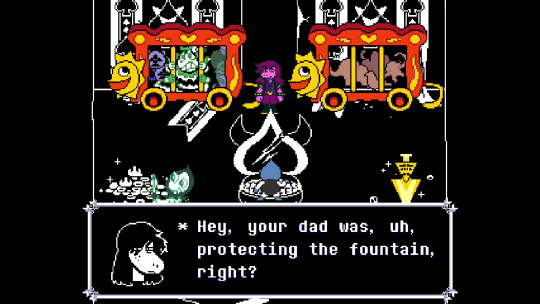
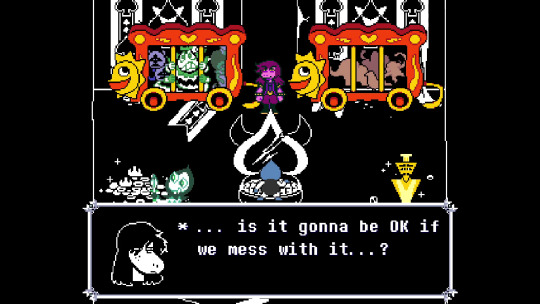
yes, susie definitely views the dark worlds as more fun than the light world. and why wouldn't she? the light world sucks for her, and she doesn't seem very aware of the fact that the dark world can also suck. you could definitely make the argument that she views the dark worlds as a fantastical escape from reality... were it not for the fact that she treats her darkner friends with just as much importance as she does kris and noelle.
can someone treat components of an escapist fantasy as real and important? of course. but given deltarune's themes of agency and control, as well as the fact that darkners exist in servitude to the lightners, I feel like you'd have to make escapism tie into forcing others into a lack of agency if you wanted the theme to feel coherent with the rest of the work. this would require susie to be limiting the agency of the darkners around her. and obviously, she doesn't do that. her presence around them might be inherently limiting, just by simple virtue of being a lightner, but she isn't aware of it, and clearly is uncomfortable with the idea of limiting anyone's agency. she encourages ralsei to make choices. and she supports lancer in basically anything he wants to do. her treatment of lancer is integral to chapter 1's narrative, and it seems like that treatment of ralsei is integral to the ongoing narrative as well!
her preference for the dark world feels very rooted in her engagement with it as its own reality. rather than trying to avoid her real-life problems by engaging in a pretense, she seems to simply want to spend time with her friends in a place that isn't cruel to her. she isn't ignoring any of the dark world's problems in service of that, either. she notices when things don't line up. if she thought of it as a fantasy, wouldn't she be inclined to ignore issues that impede the fantasy?
and critically - like kris, she does not intentionally choose her imposed role in the prophecy at first. she steps into the role of bad guy to resist it, but that role is limiting too, and she eventually acquiesces to being a hero. it's never something she's completely on board with, though. she actively pushes back the limitations that the role places on her. I find this important to reiterate when we are discussing the notion of the characters viewing the dark worlds as fantasy.
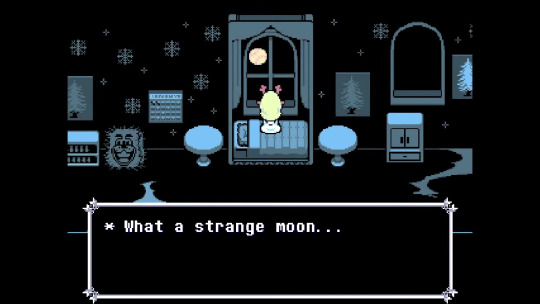
noelle has a complicated relationship to the dark worlds. susie tells her that it's a dream to make her accept the strange reality she finds herself in, which works well on her. she continues to think of it as a strange dream throughout the chapter. (though, like the others, it is not a 'dream' she entered of her own volition!)
it is also a markedly unpleasant 'dream' at times. she has her agency restricted, is kidnapped, has to evade a controlling monarch, and is even tied up in a weird evangelion cross thing on the hand of a giant robot. it's not purely fun. noelle does like scary things, and while it might be healthy for her to have an experience where she stands up to a controlling adult figure... again, the circumstances make it difficult for me to assume that this is a fantasy she would choose for herself. not impossible, mind you, but it's not the first reading of the situation that comes to mind.
and while she does say she wishes she could dream like this every day in the normal route, that does happen specifically because she was talking to the girl she likes. it makes sense she'd find that pleasant. I don't think that necessarily equates to her finding the dark worlds escapist.
and importantly, this isn't the sentiment that she expresses in every route.
again, there's a lot of analysis on snowgrave, so I won't bother regurgitating it much here. but it's nightmarish for both kris and noelle, and very likely fatal for berdly. noelle needs to believe that the event is a dream, for her own psychological safety, but one of the most important parts of snowgrave...

...is that its events, and the world it took place in, are very, very real.
noelle wants to have the strength to face her problems, both in the regular route and in the snowgrave route. rather than escaping from them, she views the "dream" as a chance to practice dealing with her day-to-day issues. it's just that in the regular route she finds that strength authentically, and in the snowgrave route, that desire is manipulated and pushed until she is forced to kill berdly. she doesn't interpret snowgrave as an escape gone wrong. she views it as a dream that became a nightmare. and those are two extremely different things.
but i haven't even gotten to the biggest thing that undermines the concept that the dark worlds are a metaphor for escapism! which is: this fucking guy is dead wrong about everything.
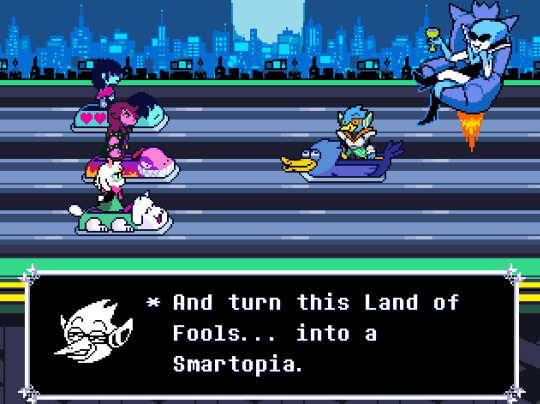
so full disclaimer - I really love berdly. I think he's slept on a lot in the fandom because he's annoying and weird. which is fair, I suppose, but I think ignoring him hinders a lot of people's understanding of deltarune's overall narrative. because berdly often illustrates a lot of concepts in the game, but his narrative framing as a joke (usually...) prevents the player from taking it completely seriously. he has things to say and ideas to show off, it's just that he's often very loud and kind of dumb in his expression of them. which is kind of the point!
ralsei brings up the idea that the darkners are meant to serve the lightners very seriously in chapter one. by extension, and by way of the literal mechanics involved in a dark world's creation, we can infer that this logic is probably something that also applies to the dark worlds themselves. they are allegedly worlds and characters that only are supposed to fulfill a dream of the lightners. but due to narrative framing and deltarune's themes, we know that that's not the full truth. however dark worlds and darkners are created, they deserve to have their own agency. they can't just exist to fulfill a higher being's wishes.
you know who else undermines that view of the dark worlds? berdly! berdly does!!!!
because berdly is the only lightner in the game so far who does take the dark worlds to be an escapist adventure! he wants to turn cyber world into smartopia. he views this as a chance to be a cool hero. he believes he's going to get the girl, he's going to shape this world to his own liking, and maybe also he's going to get queen to acknowledge him or something so he stops being a forgettable little bluebird. and not only does none of this happen, his steadfast belief that it will happen is continually a joke within the narrative!!
berdly's wishes for uncomplicated escapist fantasy are flat-out denied by the dark worlds themselves. as a lightner, those worlds should be serving him. he should have the power to do whatever he wants within the bounds of an escapist fantasy. these npcs should be singing his praises!
but he doesn't have the power. and this world doesn't sing his praise. because it just isn't an escapist fantasy. he isn't right to view it that way. his wishes for heroism are always going to be thwarted.
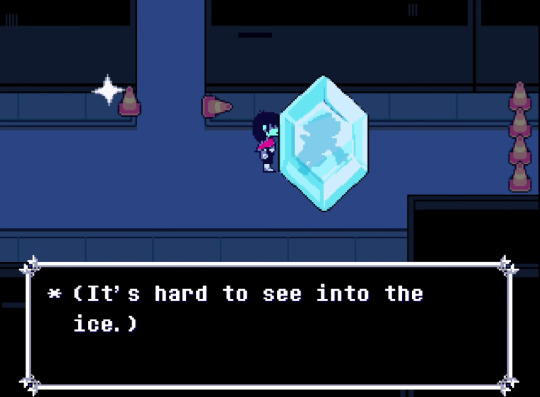
so now that I've gotten all that out of the way, let's swing back over to the subject of your original ask. queen.
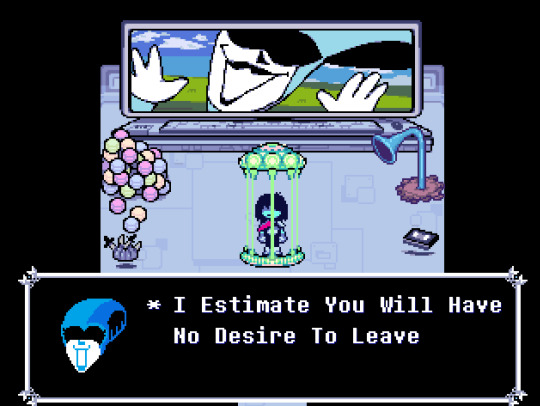
because, like berdly, queen's entire character arc is about how she's completely wrong about what the lightners actually want.
queen would in fact like nothing more to place the lightners into an escapist fantasy. she believes that that's the best way to serve them and make them happy forever. as a darkner, queen has very much internalized the idea that a lack of control is what actually makes people happy. since darkners have no choice in their destinies and are supposed to be happy in it, and since she personally finds her role as a darkner fulfilling, she believes that that's true of all people everywhere. if you want to make people happy, you just have to remove that pesky personal agency!
so she spends the story trying to force the lightners and particularly noelle into situations where she controls them in order to make them ostensibly happier. she does genuinely believe that this is the right thing to do, but as she finds out eventually, she's just wrong. noelle doesn't want that. queen believes that escapism is why the lightners use the internet... but that's totally wrong too.

while there are other searches mixed in, noelle is trying to use the internet to find her sister. instead of trying to hide from whatever happened, noelle wants to figure it out. queen's thesis about noelle and the lightners is proven wrong even before she personally encounters noelle in the dark world. it's just that queen doesn't realize it due to her limited perspective.
the concept of escapism being brought up with both queen and berdly is not there to say that the dark world is escapist. rather, it's there to say that it isn't. despite the dark worlds being a fantastical place, they are extremely real. to view them as a means of escape is foolhardy at best. you cannot act as though you are above consequences within them.
themes and ideas exist within the story for a sake of an audience. so let's get into the final character I need to discuss here. hopefully this will tie my thesis of deltarune together neatly.

that character is of course us. the player.
when creating a piece of fiction, an astute author will often identify and anticipate an audience's reactions to certain things in their work, and write things in such a way that they elicit the desired reactions. in essence, a writer is directing the "character" of the audience. how we feel and how we are anticipated to react to things is an integral part of nearly every fiction.
that effect is far more overt when dealing with metanarrative fiction that diegetically involves the audience. since the fiction is saying a lot of things about the general 'you,' the audience in aggregate, your reactions to certain things in the story have to be finely cued and anticipated by the author, so that the author can thus commentate on the reactions that you have to the story. the "character" you are assumed to inhabit is posited by the author to have certain traits.
to explain what I mean in plainer terms, I'll use the player of undertale's no mercy route as an example. because undertale is commenting on the way rpgs generally work. the player's behaviors in no mercy are attributed by characters in the story to be the result of us acting like a typical gamer. we kill the characters in the game because we want exp. and more than that, it's because we want to see everything the game has to offer. the role we inhabit in this role-playing game is that of a completionist. you could say that that's assumed to be our "character" in no mercy.
deltarune also posits that certain things are true of its audience. by being written to evoke certain cultural ideas, rpg tropes, and references to undertale, it guarantees that its audience will probably have certain traits, and spends a large amount of its conceptual focus commenting on those traits. one of those traits is nostalgia, which is probably an idea that I'll expound upon in a further essay because it's quite integral to my reading of deltarune. but the main one I mean to discuss here, and why I went off on this tangent about how audiences are dealt with in metafiction, is that we are posited as someone who believes in the logic of certain narratives.
deltarune's writing evokes a lot of portal fantasy narratives. alice in wonderland, narnia, pretty much every story where it's revealed at the end to be all a dream... the story of deltarune superficially resembles a lot of those. this, I think, is responsible for the popularity of the escapism theory. because those stories are often at their end about a child learning to put away fantasy and grow up, people tend to believe that deltarune must be about the same thing. but I truly don't think that deltarune is trying to do anything with that aspect of portal fantasy narratives, at least not directly. its main characters aren't involved in that exact type of coming-of-age arc.
instead, deltarune is very concerned with what happens to characters in fantasy, and specifically fantasy rpgs. if your world is deemed to not matter because it's a dream, what does that mean for you, who has no choice but to live in it? if you are an npc whose role has been predetermined for you via script, then can you ever decide for yourself what you want? what if you want to matter? what if you want to be your own person?
as the major controlling force of deltarune, we are initially cued to believe that deltarune is like a dream. it superficially fulfills so much of what we want from undertale fanon. hometown seems like it's a perfect idyllic town, at least until you start noticing the obvious cracks. and remember what I said about ralsei earlier? he is so reminiscent of asriel, and extremely eager to help us. it's not a stretch to say that making us specifically view deltarune as dreamlike and idyllic is probably part of his purpose in the game.
I would not say that we are posited as escapist. but the idea of escapism as brought up with queen and berdly is meant to strike at the heart of a much deeper idea that deltarune is trying to deconstruct. because if we view deltarune as a dream, escapist or otherwise, then we are inclined to write the internal realities of the characters inside off. the dark world can disappear without it mattering. we can control kris without it mattering. if it's all a dream, what does it matter? why should we care to let its characters go free? aren't we supposed to be in control?
if deltarune is an rpg... what is the significance of us interacting with it?

#deltarune#deltarune analysis#BIG big thanks to tvlandofficiall for being my sounding board and providing the flavor images for this essay#this one gets into some big overarching analysis of deltarunes construction and what it deconstructs. hope u enjoy
418 notes
·
View notes
Note
Who is Yvette and may I please know more about their streaming career? 🙏
Comtesse Yvette Preux is, for lack of a better word, one of the ‘iconic’ investigators/PCs in Eureka: Investigative Urban Fantasy. She appears in a lot of art in the rulebook, as do many of the PCs of the A.N.I.M. team and our friends.
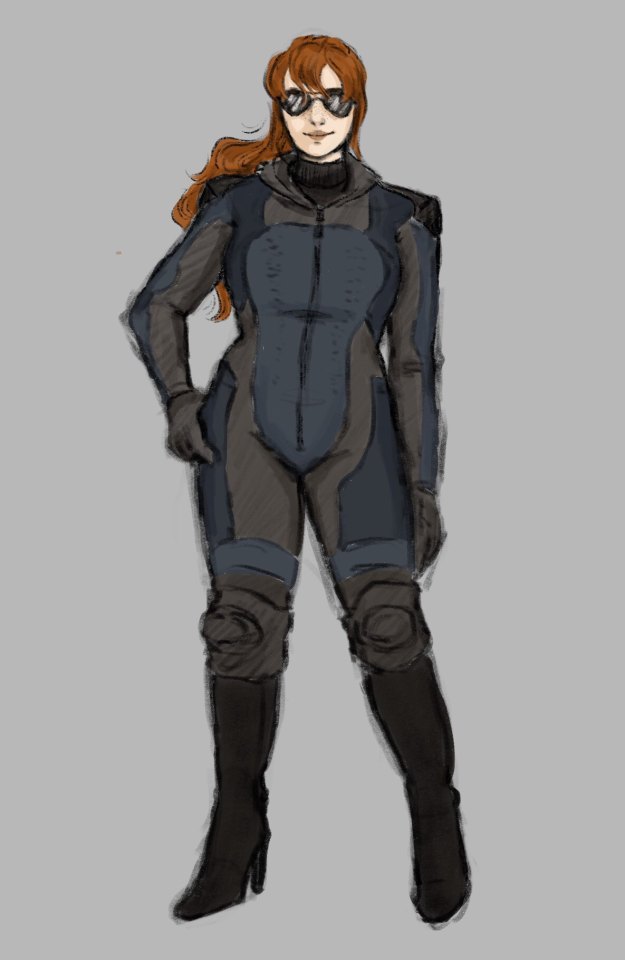
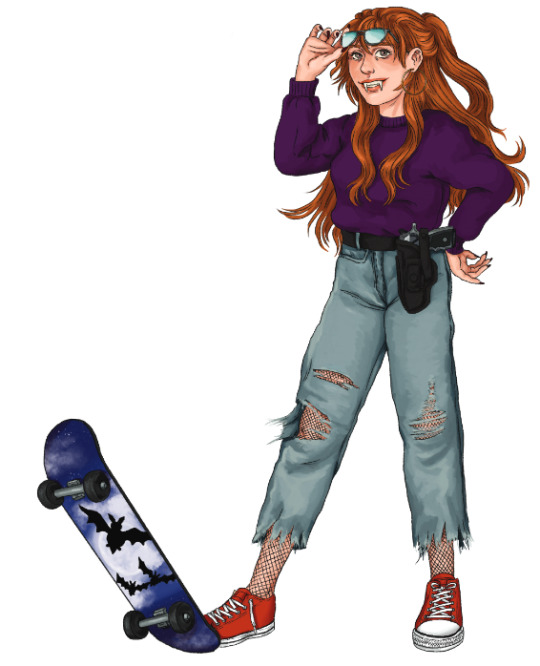
(both by team artist @chaospyromancy)
She’s also the first ever monster PC to ever be played in Eureka, back before Eureka even had official monster PC rules. The incredible success of that campaign is what set the precedent for what monster PC gameplay would come to be in Eureka.
You can read a bit of an origin story for her in this post
In the 2010s and 2020s, she has a fairly successful twitch streaming/influencer career, with her gimmick being that she claims to be a real 800+-year-old vampire, and allegedly never breaks character. Her twitch and YouTube channels cover competitive gaming, challenge runs, advanced math, firearms, and urban exploring.
In-person she is.. a little harder to get along with. She’s.. old-fashioned, and her values are very distinctly those of someone who grew up rich and Catholic in the 1200s, which ironically means she has little in common with a modern “tradcath.”
The contrast between the modern world, the modern world’s pop culture idea of the Middle Ages, and the actual Middle Ages is a major theme in the parts of her story where she’s actually integrating into the society of the 1990s and 21st century.
Many would expect her to be virulently and openly hateful, but that’s the pop culture Middle Ages. The actual Middle Ages were oppressive in different and more interesting ways.
I’ll give a few interesting examples
In the Middle Ages, women were considered the more “lustful” and “sexually aggressive” sex, a bit like men are thought of today. It’s women who were considered basically responsible for lust in the first place, to the point that it was considered a public health issue. Lust with no outlet was thought to be detrimental to one’s overall physical health. Sex or even masturbation was sometimes prescribed by doctors to combat this.
This is a comedic exaggeration/oversimplification but in the medieval world being around women would gradually fill up a Dark Souls-style Lust meter and if you didn’t do anything to reduce it it would take a chunk out of your health, making you sickly and prone to other health problems. Women were more resistant to this because they’re the source of lust in the first place. Medieval women covered their legs and their hair in particular for everyone’s protection.
This manifests in Yvette as her not caring at all about being naked in front of female friends, but being careful not to look too sexy around male friends. And then awkwardly telling them to masturbate later if they need to because it’s better to sin and live than to avoid sin to the detriment of one’s health. (In fact, knowingly damaging one’s health is a sin.)
In the art, you can see her not only wearing pants, but even wearing pants that show her ankles and legs, and wearing her hair down. It took her a long time to get comfortable wearing anything but full-length skirts around men, but these risqué (to her) outfits are symbolizing her character growth from someone who is accommodating to others to a fault, to prioritizing her own comfort, even at cost to others.
In the Middle Ages, they did not conceptualize homosexuality like we do now. No one was gay, and neither was anyone straight. Attraction wasn’t a trait of an individual, it was a fact. Homosexuality wasn’t really considered a thing that you were, it was a thing you do. It’s really hard to explain so I’m just going to hope y’all get it along with the example. Sodomy was sodomy, and that was considered to cover basically any irregular form of sex. Irregular sex between a man and woman was as much sodomy as sex between a man and another man. This also means that there was no presumption of homosexuality in the Middle Ages. You didn’t have to say “no homo” before you touched your same sex friend’s hand. Close friends would kiss each other on the mouth and stuff, and that was considered normal. (Though something you would want to avoid was spending more than a few minutes alone with an opposite-sex friend, because that could be used to call the woman’s virginity into question, which could hurt her eligibility for marriage.)
As Yvette understands it, in the 21st century, people have constructed entire communities around their enjoyment of sodomy, like how she’s a member of the gun club. She has complex feelings about that but it isn’t like she’s never engaged in sodomy before either. (She brought this to confession and did her penance so it’s fine.)
What really aggravates her is how she can’t touch or kiss any of her friends in the 21st century without it being considered sexual.
She argues it’s not “gay” for her to feel attracted to women either, it’s normal. Women are naturally attractive to everyone.
Where it really gets abrasive though is probably the classism. She’s from the noble class and still considers that to really matter, it makes her a little bit better than everyone else, and more qualified to be making decisions for people.
She does love commoners, though. All her friends are commoners, and she’s very protective of them. She’s too autistic to get that noblesse obligé wasn’t supposed to be a real principal she lives by and even back when she was for-real managing a fiefdom she was an advocate for the comfort of the peasantry.
I'm gonna have to stop listing all her quirks here because if I don’t stop then it’ll go on forever. If you want to read some short stories that feature her, subscribe to our Patreon.
I’ll segway by saying that two more major aspects of her are generosity and power. She revels in power in all forms, including the power to solve the problems of people who are helpless to solve them themselves. Like I said, she takes noblesse obligé very seriously. Jesus Christ had the power to multiply the fish and bread for the hungry, so he did. She can help, so she will(whether you like it or not). She hardly even considers it a “duty,” it’s more like why would she ever do anything else? Sometimes this means giving away staggering amounts of money, other (more exciting) times it means getting involved in a Eureka adventure/investigation, the more challenging and dangerous the better, because it makes her even cooler. This is what gets her into Eureka adventures. She’s going to help the helpless, what does it matter if it also fuels her ego?
I also just realized I’ve said very little about her actual twitch streaming career. Like I said, her gimmick is that she’s a real vampire. In the 2010s and 2020s, she is more or less “out” as a vampire, openly identifying herself as such and doing almost nothing to hide any aspect of her vampirism(except the part where she sneaks up on people in the night and drinks their blood, but she doesn’t hide that because it’s a vampire thing, she hides that because it’s an assault charge). Most people just think she’s weird, or really really dedicated to the persona. And if somebody does actually see her not reflecting in a mirror, or some other unexplainable proof of vampirism, what are they going to do? Go online and say “hey everyone I think that this popular e-celebrity whose gimmick is that she says she’s a vampire actually is a real vampire!”? Vampires aren’t real, idiot.
If you want to read short stories about her, you can get them with a $5 subscription to our Patreon,
and she and her exploits in Eureka campaigns are also talked about a lot in the A.N.I.M. TTRPG Book Club.
The Eureka: Investigative Urban Fantasy rulebook will also have a section that will probably be called “the making of a vampire” that will detail some of her actual living life and shine a little more light on how a vampire actually comes to be in Eureka’s world.

#eureka#eureka: investigative urban fantasy#eureka ttrpg#ttrpg tumblr#ttrpg community#indie ttrpg#rpg#ttrpg#vampire#indie ttrpgs#vtm#vampire the masquerade#vampirism#vampire the requiem#vampiress#vampires#urban fantasy#supernatural#medieval#medieval history#middle ages
111 notes
·
View notes
Note
Wasn’t the entire thing in the hunger games that Katniss wasn’t a chosen one or predestined? There was no grander plan. She was just a random unlucky girl who happened to be there at the right (or wrong) time. So why does it now like they want to tie everything back to her as if she is some special prophecy…
THANK YOU!!! That's exactly it.
Like, Katniss was just UNLUCKY. From the moment Prim's name came out of the bowl, everything was set. Prim's fate was sealed, one way or another, and so was Katniss's. Panem's fate took longer, but it happened eventually too. Katniss was a victim of a world where nothing, not her own destiny, not her love, was hers to choose. Everyone decided how she'd be presented for her. She kicked off the revolution to win her freedom not by being herself, but by having the public's perception of her beautifully manipulated every step of the way until she learned how to mimic the motions and become part of the propaganda machine too. Her tragedy was her utter lack of agency- and that is reflected in how she didn't do anything special, she was just an unlucky cog in a machine made of misfortune. That was the beauty and tragedy of her character.
In TBOSAS, a lot more started being tied to her, but it was indirect, helped by the distant timeline, so it came across as just hinting to her origins/roots. We got an impression her father was Covey and that she was in some way connected to the previous victor of 12. That's fine- that's just deepening the lore. So I thought.
But this? This is too much. Everything is getting cannibalized by Katniss's story, to the point that you almost gotta wonder if the next step is saying that the first rebellion was captained by Katniss's great-great grandpappy who loved to sing and raised jays which the capitol then took once the war started to make Jabberjays, and the injustice of losing his beloved birds was just TOO MUCH and he became a leader of the resistance. And he was the one to figure out Jabberjays could be fed false information too, probably. And he deliberately bred the Jabberjays with some mockinbirds to make mockingjays on purpose to spite the Capitol!!!
I made that all up, but I would honestly not be surprised if it actually was true at this point.
We all love Katniss, but the beauty of her character was that she was just one of many, a figurehead propped up by kingmakers who manipulated her to their own ends, for good and for bad. Now she's being presented as a sort of Chosen One in direct defiance of this, to the cost of the ENTIRE worldbuilding, lore, and generations of characters before her.
What a fucking shame.
85 notes
·
View notes
Text
Natsuhi having a complex over not being the successor because of a lack of agency. She wasn't able to choose her marriage and she wasn't able to fulfill expectations even within that marriage so she took agency of the situation by pretending to be this wife/mother who is BETTER than the fools around her, actually, she's better than them and she locks this deep inside her heart and it gives her strength while also turning her very pitiful.
And Eva is a mirror of this, denied agency in her own life because of not being a man, and moving on to gaining control in any way she could despite these barriers. But she does it by putting down other women, by pushing down on others and ultimately she, just like Natsuhi, accepted her role as a wife and mother rather than try to become the successor herself (at least until EVA Beatrice came into play) but she's still ruthlessly trying to control George and find a way to make him become the successor.
And this of course reflects in both her interactions with Natsuhi (attempting to get Natsuhi to give up, demeaning her efforts to make herself feel superior) and with Ange (the child Eva didn't want, who she's bitter and cruel towards, but Ange is also a girl who CAN become the "successor"--to Beatrice, if to nothing else--in the wake of the tragedy that stole even more agency from Eva). Both of whom are very notably women who are suffering (and Rosa can probably be added to this too, naturally). And Eva knows no way of how to act towards them other than to put them down even more, to not recognize their suffering, to see them without love.
Also, Eva and Natsuhi's desire to be heard and noticed were both locked inside them with the witch's magic, but Eva's was always more immediately visible. And thus EVA Beatrice appears earlier in the story as shown to the reader, and we only learn that Natsuhi's version of events is fake in the answer arcs because that's the only thing that keeps her going, whereas Eva feels she can at least get George into the spot of successor early on in the story.
64 notes
·
View notes
Note
apologies if i'm interpreting wrong, but do you not like the family aspects in gravity falls?
I enjoy the family aspects in gravity falls in terms of surface level enjoyment... but even then I do agree wholeheartedly with the post I reblogged and I think it's definitely applicable to a critical examination of the story, as it would be in Any story. mainly in terms of stan and ford's dynamic.
I've thought before about how stan's tumultuous relationship with ford really comes down to the failings of "the family" and particularly masculinity and the concept of The Family Man as a breadwinner and every time it frustrates me for what it is and intrigues me for what it potentially says as a deconstruction, even if an unintentional one. stan's core values are familial in nature, which to the audience is a purely noble goal. therefore, when stan does the things she (and I'm using she/her as always for stan because I interpret her as a trans woman) does, it's "all for this family", which is a very empathetic goal. but it's also one that snowballs into the devastating rift between her and ford: ford wanting to go to college and remove himself from The Family is implicitly depicted as a betrayal, if not to the audience then at least to stan. and yet it's perfectly understandable Why he does this if you actually examine the stan twins' childhood, which is that of two siblings being forced to compete in a black sheep/golden child dynamic in a poor household, overseen by the abusive patriarch figure that is their father. when ford refers to his dynamic with stan as "suffocating" (expecting dipper to relate), it's simultaneously insight we're meant to read as selfish and anti-family, as well as being perfectly logical. stan and ford depend on one another for survival and recognition as they deal with both the trappings of their home life and peer abuse at school- and, at the same time, are locked into their roles as "potential breadwinner" and "the fuck-up twin". would that not be suffocating? would you really feel secure trying to maintain a close relationship with your twin like that, even if you did love them?
I refer to this as a matter of masculinity because at its core the trappings of the (american, western, whatever you want to call it) family are often patriarchal in nature: everything revolves around the authority of The Father, who is succeeded by The Son. stan's lack of success in terms of bringing money to the family reflect her failures to perform as a man. the only time she begins to succeed in this role is when she's impersonating ford. (and here you can kind of see the foundations of my headcanon for her as a trans woman... but that's off topic) at the end of the day, ford's desires for agency outside of his family are punished by the story: "you care about some dumb mysteries more than your own family? well then-- you can have 'em." and this is only truly rectified when ford relents, admits the true importance of family, and gets on a boat with his twin. even if I think it's elaborated on in ways that lend itself towards a more complex story, even if I think it could work perfectly well as a deconstruction if you were to read it that way, I think this is the type of story they're trying to tell and the one that is most commonly related to by an american audience.
I say that this frustrates me because as much as I wish it were the case, I don't believe gravity falls intends to make a critical commentary on the nature of the family. I think it says a lot about how those dynamics can be strained or muddled by factors such as miscommunication, trauma, abuse, etc- but at the end of the day it's intending to be a very "familial love surpasses all" type of story. does that mean it's unwatchable garbage? not really. I obviously love the show and still enjoy familial dynamics for a lot of reasons and think there's good to come of those kinds of stories. however I also think there is a lot to be said about how dangerous the idea of "family comes first" is, both in terms of justifying violence and absolving or enabling abuse.
*note that my specifications of the structure as "american" or "western" are due purely to a lack of perspective. I'm sure there are examples of these types of trappings across various cultures I just can't confidently elaborate, and in the context of the show we're talking about a story that takes place with american characters. kind of a pointless amendment but just in case.
#askbox#lab discussion#this isn't the most structured response but it's a response. hopefully you understand what I'm trying to say#btw my very vague tags on the original post weren't actually about gravity falls! I was thinking about my ocs.#ev has a lot going on in terms of deconstructing the concept of 'the family' and fatherhood or motherhood. etc#gfposting
105 notes
·
View notes
Text
Quick Thoughts p2
I’ll make this quick but your hatred/dislike or lack of engagement with characters does not make you nuanced, correct or an activist. You’re just insufferable.
Hating every character from Piltover, is neither sticking it to the rich man nor the fight against real world classism. It’s a lack of engagement in the canon of a show yall claim to love. Wishing death or the indifference to it on the black female character because she is a politician is not progressive. Saying that she’s hot and nothing else or just tying to her socioeconomic status and manipulation( something of which she did like twice in the first part of season 1) is playing into racial tropes and is just ignorant, even when a black person does it. The lack of respect the fandom has to the man the created Hextech in his studio apartment is baffling. To remove his agency and autonomy just to stick in your ship and hate on his canon love interest is insulting. This shouldn’t be controversial but for some reason it is; he did what he did because he believed it to be the right choice. He’s impulsive, emotional and stubborn. He agreed with her(he also didn’t listen to her), and didn’t listen to his own mentor because he thought he knew best. He even apologizes for this to her at the end of season 1 and admits she was right.
Calling the wlw ship oppressed x oppressor is incredibly shallow in fandom and dangerous outside of it. People are allowed to/ do fall in love with whomever. We as humans will always exist outside the government/ political environment we are confined in and should be able to and do to find love regardless of race,class or creed. If you’re American you should be aware of the Loving v Virginia case. Calling one of them a class traitor for finally choosing her self and working with the best she got to take down her sister is counterproductive.
There is something insidious in the way the fandom only lets the female and POC characters exist in their lowest moments and tear them apart. Yall really are kin to the most stereotypical League of Legends player. What happened to character growth? Also if the story happened the way I see some of yall wanted to then there would be no story. Cause all these would not be doing anything or growing.
A lot of the fandom wants to sound like nuanced, progressive leftists, but in actuality yall look and sound like bigoted conservatives who have yet to do the emotional self reflection to have these conversations, but want to sound smart.The last thing I’m gonna say here is this:
Arcane is to white ( it’s not just white people, I will concede on that point) leftist the same way Handmaid’s Tale is to white feminists.
Ps so this wasn’t all that quick. Maybe cause I’ve had to create a new TikTok account to post my edits so I’m seeing a lot of the dumb bigoted takes again on my fyp. It’s irritating that I gotta go and reblock accounts and tags on TikTok now but anything to keep me from cussing people out.
PSs Also if yall come swinging in my notes or reblogs I will just block you. Hell if you disagree at this point you’re getting blocked cause yall playing on phone with the same dumbass reasons some of which yall been spewing for 4 years. This isn’t really meant to be a discussion but me just stating stuff, if that makes sense. Me and my rambling I guess.
#arcane#arcane fandom critical#mel medarda#mel my beloved#mel league of legends#meljay#jaymel#goldenforge#caitlyn my beloved#league of legends caitlyn#caitlyn kiramman#caitvi#vi arcane#arcane violet#vi league of legends#arcane jayce#jayce my beloved#jayce arcane#jayce league of legends#jayce talis#mel medarda arcane
50 notes
·
View notes
Text
cw: sex workers reader and toji, wrestling, he puts you in a headlock, ass slapping
as a sex worker under an agency, you sometimes get the opportunity to perform certain tropes that you wouldn't think too much about doing on your own. there have been quite a few that your manager has thrown your way; medical play, light BDSM scenes, and now, mixed wrestling. you've done your fair share of oiled up fighting with other women in your career, but you've never wrestled a man before.
its all staged, much like real wrestling except—except you're not too sure why or how you were paired up with infamous actor Toji Fushigurou. technically speaking, you two aren't anywhere near the same weight class, but you're not sure if technicalities even count for a job like this.
there are a few rules: no actual striking of each other, take the others underwear off during the fight, no biting. as the ref lists off all the other little things you two need to remember, you both take each other in. Toji is, for lack of better words, fucking huge. he's got at least six inches on you, packed with muscle and a nonchalant kind of finesse that makes you just the slightest bit nervous under his stare. he stands only in a tight pair of black boxer briefs, and you can make out the outline of his soft cock, despite the fact that it still rests low on his thigh.
he grins at you when he notices your ogling, winking once when you frown at him. he's been in the industry for so long, he's more than used to being objectified, but something about your little defiance that shines in your eyes makes him want to tear into you, piece by piece.
"Go!" the ref announces once she's finished listing her instructions. Toji doesn't immediately attack you, instead grins at you, hands on his waist as he cocks an inquisitive eyebrow in your direction. with a, albeit weak, battle cry, do you lunge at him—
and quickly find yourself pinned. you don't know how he does it so quickly, maneuver you as if you only weighed a pound, but he does it. catches you in his arms and swings you around until your back meets the floor with a grunt, the wind suddenly knocked out of you. he's gentle though, where he pins you with his knees on either side of you.
"At least try to put up a fight," he teases you, pulling at the straps of your bikini. but you fight him off as much as you can, grunting and cursing at him, taking this entirely too seriously for what will ultimately end with you being fucked into oblivion by the man. doesn't mean you have to go out without a fight, though.
although, your fight doesn't mean much to Toji. by the third and final round, you're fully naked and he's still got his underwear on. your ass is slapped raw by how many times his too big hands have groped you, nipples pinched to sensitivity. you're not surprised when the ref announces your lost, tells Toji to claim his prize.
and he does just that. pins you on the floor, finally releasing the thickness of his cock. he's cocky the entire time, teasing, with how he pins you on your stomach, holding you in a headlock as he fucks his cock too deep inside of you to put up much of a fight anymore.
"Did you even try?" he asks, breathy, a smirk plastered on his face as he looms over your shoulder. "Or did you want to end up like this? With my dick in your stomach? The fight worked you up that much, huh?"
he taps your clit with too thick, mean fingers with his other hand, tightening his bicep around your throat when you try to get smart with him. he knows its all bark and no bite, if judging by the way your cunt sucks him in is anything to go by. you can only gurgle out a curse to him, eyes rolling back in your head when his wicked laugh only pushes you over the edge to climax.
(after the scene ends, he kisses your temples and squeezes your waist, telling you that you guys should do more scenes together. you only stick out your tongue at him, promising to get stronger so you can take him down next time. he laughs at you, more than happy to entertain your thoughts that will, truthfully, never come true.)
#—new treat in the streets! 🍫#toji treats! 🍬#I thought about this the other day and got so h word about it#tmi but I used to primarily get off on wrestling videos for so long lmfao#going back to my roots 👍🏼#also this is one of like seven things I wrote today which I am Proud of#will post the others through the course of the week!!#maybe. I get excited about everything and wanna post it all at once LOL
167 notes
·
View notes